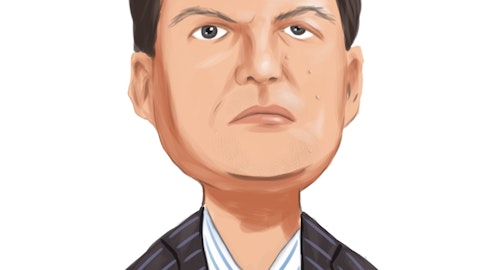As we all know, the more direct business we have, the more margin it drives and then we have the latitude to invest or not as much as we want into performance marketing, driving new customer acquisition. And again, we’re getting smarter and smarter about who we go after, how we go after them and how we optimize for the lifetime value of that customer base. So I think that’s how we think about it. In terms of the practical like have we figured out all the nuts and bolts of the best way to promote the brands together. The best way to promote One Key, I think we’re still on a learning journey there, but we’re excited about it. And the One Key work was awesome and you’re going to start to see the brands more present in other brands as time goes on.
But I think the big opportunity, as I mentioned about new members, we took a group that didn’t have membership basically, and turn them into new members in a big pool of membership where they can get a lot of benefit across a bunch of different products that they couldn’t get before from Vrbo. So that’s what’s exciting to us. Our goal is to drive much more direct business through that. And as I think we’ve said before, we look at spend for loyalty, for marketing, for any kind of pricing and discounting things we do, all as one pool of capital that’s focused on the best way to acquire and retain customers, and that’s really — so we’re happy to trade those dollars off to the most efficient way to drive the overall business. And that’s what you’re going to see us do over time more and more.
Julie Whalen: And I think the short answer on the EBITDA question post tech migration is, we expect to drive obviously both. We want to have strong EBITDA dollar growth and we want to have margin expansion. We’re not going to need to invest as much as we have in the past. As Peter said earlier, now the protect migration is complete. We should be starting to get more efficiencies out of machine here by deprecating systems, redeploying resources, cutting all the incremental costs associated with that and just getting more output, getting more leverage from all of the goodness that we’ve been investing in the past. Now we are also wanting to be on the offensive as we said. So there may be times in areas that we think we need to invest, still driving EBITDA growth and maybe not as much EBITDA margin in certain situations. But for the most part, we’re committed to both, but this is a year of offense and so we want to have that flexibility.
Operator: Our next question comes from John Colantuoni from Jefferies. John, please go ahead.
Chris Roop: This is Chris on for John. Thanks for taking the question. So there have been some questions around the trajectory of alternative accommodation nights growth across the industry broadly. Could you elaborate on kind of how recent demand trends as far to Vrbo and beyond the onetime impacts from things like the tech migration in Maui fires, have you seen any changes in customer preference for vacation rentals?
Peter Kern: Yes. Thanks, Chris. I think for us, and we’re a little differently situated than our competition. But for us, we saw a huge COVID era boom when everyone was trying to be in their own house and rent their own space and whatever. We definitely saw a little bit of pressure on that this past year as that kind of came off. But in terms of how things are progressing, once you kind of reset for that, we think demand is pretty stable, and there’s lots of opportunity for growth. In the other parts of the business, our friends across the way, they play in urban much more in shared accommodations. We do think there’s opportunity in urban and we are building supply in many areas, but we are sticking to our knitting of the whole home whole apartment experience as opposed to shared spaces, et cetera.
We think there’s lots of runway there, and there will be probably more supply coming on as homeowners struggle with mortgage rates and other things. There’s a good opportunity for supply there. So we still see plenty of opportunity in compressed places and compressed time, banded time periods in different areas. So I think we feel good about going back on offense. We’ve been playing, this is one of the areas we’ve been playing a little bit with the hand tied behind our back. But macro in the whole home space, we expect there to be growth again, barring geo political, who knows. And I can’t speak for the other shared accommodation spaces and other things, that’s not where we’re focused.
Operator: Our next question comes from Anthony Post from Bank of America. Anthony, please go ahead.
Justin Post: With bookings growing 7% this quarter and you’re suggesting similar growth next quarter, how do you think that positions you for top-line growth next year? You mentioned maybe accelerating off of this year. So just thinking about the bookings growth rate and implications. And then second, I know there’s been a lot of effort to increase app users versus maybe using search marketing. Are you seeing anything in the customer metrics, and I apologize if it’s already been asked, but anything in the customer metrics that show better repeat rates or better return on that ad spend than you were getting, say, a few years ago.
Julie Whalen: I’ll take the first one. I mean as far as the bookings, I think this past quarter and the subsequent Q4 guidance that we gave those are both indicative of some shorter-term things that have occurred. So as we mentioned, we were unfortunately impacted by the Maui fires that brought down gross bookings lower than we had expected in Q3, and we’re being thoughtful in our Q4 guidance of what could potentially be an impact associated with the uncertainty in the geopolitical environment. So we’ll see how that plays out for the quarter. So early in the quarter, we’ve seen very little noise at this point, but that doesn’t necessarily provide an indication of what’s going to happen in 2024. And for all the things that Peter mentioned that we have completed and all the momentum we have in the underlying health of the business and coming out of the tech migration and all the goodness that’s coming from the One Key launch and the growing base of app and loyalty members and all of that kind of adding on top of each other as we incrementally roll through the year should drive that gross bookings up.
Peter Kern: And I’ll just add, and I’ll take the second part. But I wish I could tell you that this migration is like we flip a switch when it’s over and everything goes 2x. But it is, you’re growing out of a period of lots of change with all the tools you need to go faster, but they built on each other over time. So our first week out of the gate is not going to be like our 52nd week out of the gate. And so this is something where there’s some noise in the numbers as we alluded to from geopolitics and other things, we’ll see where it ends up landing, but our enthusiasm for what next year can bring is built on the underlying building blocks, not on the what is the trend line today or what is the macro. So that’s where our enthusiasm comes from.





